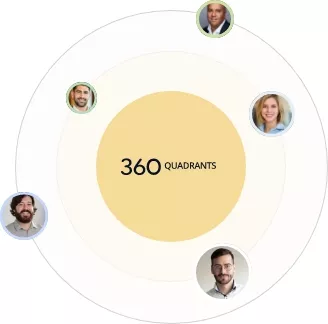Best AI in Fintech Solutions
AI in Fintech refers to the theory and development of computer systems capable of performing finance-related tasks that usually require human intelligence. It is an application of AI technology that enables the financial sector in various forms such as designing investment strategies, anomaly detection with pattern recognition, voice recognition, text mining, semantic analysis, and market analysis with data mining. The AI in Fintech market in this report is defined as the summation of AI-enabled Fintech solutions and services.
Top 10 AI in Fintech Solutions
- IBM Watson Platform
- MICROSOFT Cortana Intelligence Suite
- GOOGLE Cloud Platform
- SALESFORCE Einstein
- AMAZON AWS Alexa
- INTEL Movidius Neural Compute Stick
- SAMSUNG Nexfinance
- INBENTA InbentaBot
- OakNorth Platform
- MICROSTRATEGY HyperIntelligence
Market Overview
Artificial Intelligence (AI) is primarily concerned with reducing the human machine gap by enabling devices with machines to gather, analyze, and anticipate future outcomes and resemble an advanced and intelligent system, similar to the human brain. It empowers a normal computer system into a machine learning enabled computer system, which is capable of performing tasks that usually require human intelligence.
With increasing use of AI based technology across industries, the financial sector has also witnessed drastic technology-led changes over the last couple of years and shifted from an on-premises process oriented infrastructure to a technology enabled on-cloud infrastructure. This technological change in terms of infrastructure has laid the foundation stone for Best AI in Fintech market as most of the financial service providers are now concentrating more on their IT departments to improve efficiency and facilitate game changing innovation. They use this machine learning intelligence in most of their business process applications such as credit scoring, asset and portfolio management, debt collection, and insurance premium.
Most of the Fintech startups such as Cape Analytics and AlphaSense are encroaching upon providing seamless customer friendly solutions for adding more value to their customers. Best AI in Fintech solutions and services have revolutionized the business operations of many successful and large financial organizations in terms of performance gain, improved financial operations, reduced costs, and several other benefits. With the latest development in AI enabled financial solutions along with their increasing adoption rate among end-users, deployment of these solutions has become an important part of financial companies to manage their banking operations effectively. Most of the big players such as Microsoft and Salesforce, have already introduced next generation Fintech solution with Augmented Reality (AR and, Virtual Reality (VR) enabled advanced analytics, and cognitive solution to gain the first mover advantage in the AI in Fintech market.
The global AI in Fintech market has been segmented into solutions, services, application areas, deployment modes, and regions. The solution segment of the report includes data discovery, data quality and data governance, and data visualization. The services that are covered in this report are managed and professional services. The report also covers deployment mode of Best AI in Fintech solution which comprises cloud and on-premises.
The competitive administration mapping (Quadrant) showcased underneath gives data for the Best AI in Fintech market. Seller assessments are based on two wide categories: item advertising and commerce technique. Each category carries different criteria, based on which merchants have been assessed. The assessment criteria considered beneath item offerings incorporate the breadth of advertising, conveyance (based on businesses that the merchants cater to, sending models and memberships), features/functionality, conveyance, item quality and unwavering quality, and item separation. The assessment criteria considered beneath trade procedure incorporate geographic impression (based on geographic nearness), channel procedure and fit, vision arrangement, and viability of development (based on advancements, associations, collaborations, and acquisitions).
The AI in Fintech solutions in this category are:
The AI in Fintech solutions in this category are:
The AI in Fintech solutions in this category are:
The AI in Fintech solutions in this category are:
Market Dynamics
DRIVERS
Availability of Spatial Data
The AI learning methodologies which include supervised, unsupervised, and reinforced need spatial data to provide solutions for various complex problems. In BFSI, the availability of huge amounts of raw data has increased the traction for AI-based technologies to understand various business trends and challenges across regions, which significantly drive the AI in Fintech market. Detection of fraudulent activities, financial modeling simulation, and financial market research are some of the areas of banking sector where the use of AI-based technologies have increased a lot. Therefore, it is expected that the increasing awareness among business executives about the benefits of AI can further increase the demand of AI in Fintech market.
Growing Internet Penetration
The internet is quickly emerging as a mission-critical platform for enterprise applications and smartphone users. The growth of the internet has enabled companies to add services and perform tasks that were previously cost prohibitive. Linking customers, suppliers, and business partners; achieving personalized communication with customers; connecting employees worldwide; and provide finance related queries are some of the examples of such services. The internet technology will continue to blossom as organizations web-enable their enterprise resources to achieve greater efficiencies and offer new services.
In AI-based Fintech solution, it is very necessary to connect devices with the internet to exchange and process the information in real time, so the increasing trend of the internet is significantly contributing to the growth of global AI in Fintech market.
RESTRAINTS
Need of Talented Specialists to convey AI in Fintech
Integration of AI in financial companies can be done through both software and services—depending on the level and nature of integration. In addition, enterprises need professional services to customize a particular capability to implement on their technology platform. Several machine learning-based offerings for predictive analytics are deployed to support an industry or domain-specific usage scenarios. Professional services of a data scientist or a developer are needed to customize an existing machine learning enabled AI service, which caters to a financial industry. Since the AI in Fintech concept is new and still in the developing phase, the availability of consultants with high expertise in the deployment of AI is limited which can be a restraint for the AI in Fintech market.
OPPORTUNITIES
Increasing Mobile workforce will surge further innovation in the Best AI in Fintech market
In the Fintech space, the majority of the start-ups have started aiming to provide more innovative, technology enabled solution to cater to the needs of increasing mobile workforce globally. Most of the start-up companies, for instance in credit scoring (Avant, Affirm, Zist finance), personal assistance (Digit, Kasisto, Trim), and fraud detection (DataRobot, Feedzai) are concentrating more on offering tech savvy solutions which can reduce the operational cost for banks. A tech-savvy banking institute, who has a huge number of mobile workforce and a strong interest to automate their banking process will continuously try to implement different AI enabled Fintech solution on their premises, which will ultimately drive further innovation and accelerate the growth of Fintech firms.
Growing usage of AI-enabled technical solution in the market
Like other AI enabling space, the capital market has also witnessed an increasing surge in technological solutions especially in the areas of real time trade processing platforms, advanced analytics, and improved regulatory compliance. With the implementation of AI into these macro-economic factors, capital market players are looking to implement AI enabled solution to increase efficiency and aid faster decision-making. Client relationship management, trade execution, reconciliations, transaction reporting, and tax operations are some of the new areas where the prospect of using AI enabled solution is high, and several of the capital market players such as New York Stock Exchange and London Stock Exchange are already using it on their premises.
CHALLENGES
Difficulty to cope up with the rapidly expanding scope of AI in Fintech solutions
The pace at which the information technology is growing has made it difficult for Fintech vendors to cope with it. For example, the technological enhancements in various automated banking services such as credit scoring and fraud detection are creating problems for the Fintech solution providers as they need to develop a new program or machine learning coding whenever any new technology emerges in the market. Moreover, new technologies keep on coming in quick succession, and usually, they are not supportive of the existing AI in Fintech concept.
Development of smart human aware Fintech solutions
The actual projections aimed at during the emergence of AI technologies in the financial sector were to make them human-aware, i.e., developing models with the capabilities of human thinking characteristics. However, creating an interactive and scalable solution, which can adapt to any new or emerging technologies remains a challenge among the developers of Fintech solution providers. The developers face problems in terms of writing machine learning codes for Fintech solution, which can interpret the human input such as knowledge and specific directives. Thus, the development of human-aware Fintech solution remains a challenge among machine learning developers.
What are Key Industry Developments in Best AI in Fintech solutions market?
Fintech market is all about user experience and customer engagement. With rapid developments in technology such as Augmented Reality (AR), Virtual Reality (VR), and innovative service offering, AI is all set to revolutionize the financial sector by providing real time user experience and customer engagement.
Some of the key technological developments of the Best AI in Fintech market are mentioned below:
Use of AR or VR in data visualization products:
Nowadays, financial markets and share trading platform use automatic processes and algorithms, due to which a lot of unstructured data is generated. Analyzing these unstructured data manually through computers is very time consuming and error prone. Furthermore, it becomes nearly impossible for human being to analyze every data generated. To get rid of this problem, financial firms have started using VR enabled data visualization products to analyze a large cluster of data. It helps the decision makers to understand complicated concepts and new patterns visually. Also, it helps end-users to access a general picture into highly specific areas easily and quickly.
Use of AR or VR in virtual payments:
With the increasing business related transaction, fraudulent and money laundering related activities have also increased in the financial sector. As a result of which, financial firms are mainly concentrating on to provide safe and secure payment options to its customers. To tackle this kind of problems, VR or AR technology has brought a new payment option, which will allow the customers to make payments virtually. This newly developed AR or VR enabled payment option is more secure as compared to traditional or physical payment options.
Best AI in Fintech Solutions, By component type
The global AI Fintech market is arrived at, by summing up the solutions and the services components associated with it. The Best AI in Fintech market by component is segmented into solutions and services. Fintech solutions are deployed by financial institutions to analyze large amounts of data in order to offer personalized products and services and meet regulatory issues. On the other hand, platforms are deployed by financial institutions for better customer engagement. The services component allows organizations to manage AI-enabled solutions.
SOLUTIONS
Anticipating the customers’ need with umpteen innovations has become an integral part for finance providers to analyze the customer behavior efficiently and accurately, in order to offer relevant solutions at the right time. The solutions component is segmented into software tools and platforms. The software tools segment is further segmented into data discovery, data quality and data governance, and data visualization tools.
Software Tools
Software tools are used to provide AI enabled solution in the financial sector. This software tools need data as an input parameter to provide the solutions for various problems. In most of the banking applications, the software tools discover hidden patterns in data and data sets to predict the outcome of various problems. In this report, the software tools segment is segmented into data discovery, data quality and data governance, and data visualization.
Data Discovery
In the financial sector, a lot of non-trivial data is generated, which can be utilized to provide various innovative solutions in the Best AI in Fintech market. Data discovery software tool plays a vital role in extracting this non-trivial data and providing skills in understanding data relationships and data modeling, with the advanced analytics function to reveal the insights. With data integration and data preparation capabilities, the data discovery software tool helps financial service providers connect with their relevant customers, with the relevant solution.
The data discovery software tool is expected to witness a strong growth in the financial sector. This growth is attributed to the growing amount of data, which increases the usage of predictive analytical tools for stock prediction, fraud detection, and other varied utilities.
Data Quality and Data Governance
Due to the presence of a large amount of unstructured data with stringent compliance-related issues, financial service providers are using data quality and data governance-related software tools on their premises. These tools provide accurate, complete, timely, and consistent data as per the requirement.
The data quality software tool is all about keeping data from getting contaminated by maliciously invalid information or decay. It helps organizations in taking smarter business-related decisions by cleansing, standardizing, matching, and profiling their non-trivial data. On the other hand, the data governance software tool assigns responsibility and ownership of data to various compliance measuring processes, manages various business processes, and leverages technologies to protect organizations from non-compliance-related issues.
Data Visualization
Data visualization is primarily used to interpret data in an interactive format through data presentations, thereby making it easily accessible for users to read and analyze the data. The data visualization software tool is enabled with a dashboard, enabling users to analyze multidimensional data on a single screen. The user can slice or dice the data as required using simple techniques. This software tool is powered by varied graphical components, such as charts, diagrams, and graphical presentations. The data analyzed through data discovery, and data quality and data governance software tools can be understood through this data visualization tool.
Platforms
Platforms are used to deploy various AI-enabled Fintech solutions. Most of the financial organizations use such AI-enabled platforms to develop their solutions as per their requirements.
SERVICES
Services play a vital role in the efficient and effective functioning of Fintech solutions. They comprise professional and managed services. While professional services include consulting and integration, the managed services consist of support and maintenance, and infrastructure management services. As the market grows, the demand for services is also likely to increase, specifically for the managed services segment.
Managed Services
The managed service providers deliver infrastructure services that help organizations in managing their AI-enabled solutions. The managed service providers take care of all the hardware and software-related functions, while organizations are only responsible for updating and installing business applications and configuring the company policies. Managed services help organizations increase the efficiency and save costs for managing the on-demand AI-enabled financial services.
Professional Services
Though most of the financial firms are aware of the fact that AI can transform their business processes, they still struggle to find out the right solution that can improve their business function. As a result, AI-enabled Fintech solution providers offer consulting services, in which they provide a detailed analysis of their client’s requirement. On the basis of this consulting service, financial firms select the solution as per their requirements. Additionally, working on AI-enabled solutions need skilled professionals, which is not the case with financial firms. This is the reason why Fintech solution providers offer training services to their clients to become acquainted with the installed solution.
Major Applications of Best AI in Fintech Solutions
The Best AI in Fintech market has been segmented by application area into virtual assistants (chatbots), business analytics and reporting, customer behavioral analytics, and others (market research, advertising, and marketing campaign). Virtual assistants and customer behavioral analytics applications areas are likely to experience demand in the near future. Virtual assistants (chatbots) are widely used by financial institutions, as they are changing the way banks interact with their customers. Virtual assistants are proving beneficial to banks and other financial institutions because they increase the efficiency and offer services in a minimal time, along with great accuracy. The application areas play a crucial role in analyzing the customer behavior to help sustain in a competitive market.
Virtual Assistants (Chatbots)
Virtual assistants or chatbots are software programs that use Natural Language Processing (NLP) to communicate with people. Chatbots carry out simple tasks and are built with the aim to interpret and respond to plain texts and voice questions. The banking and financial institutions are deploying chatbots for cost-effectiveness, accuracy, and speed, and assisting in various tasks, such as balance inquiry, money transfer, and financial guidance. Financial companies such as MasterCard, Bank of America, Capital One, and Wells Fargo are using chatbots to take advantage of the AI technology. These companies use the chatbots for conversational commerce or voice-first banking. For instance, Bank of America uses the chatbot, Erica, which helps customers in carrying out various tasks, such as making payments, saving money, paying debt, and in balance inquiry. Additionally, chatbots are playing a significant role in banking, as they eliminate the need of a human assistant for answering customer queries. The financial companies are using the AI technology to leverage the benefits, such as 24/7 customer support, easy-to-use applications, and collection of data. Finally, in banks, the use of chatbots would increase in the future, and the banks would use it to gain a competitive advantage over their peers, attract more customers, and make customer communications easier.
Business Analytics and Reporting
The business analytics and reporting application area enables financial institutions to meet the regulatory and compliance requirements, as well as, analyzes the customer behavior. The AI technology is becoming important in creating predictive models for customer behavior analysis as well as to design software that helps organizations solve regulatory issues. The business analytics and reporting application area is further segmented into regulatory and compliance management, and predictive analytics, in this report. These are the 2 important areas, on which companies are focusing to deploy AI solutions, in order to get the maximum benefits of the technology. The predictive analytics segment is expected to grow at a CAGR of 40.9% during the forecast period.
Regulatory and Compliance Management
Regulatory and compliance management is becoming critical for financial institutions in order to meet their regulatory requirements and manage the compliance records, which is a vital and expensive task. To meet the requirements, bank attorneys and loan officers spend thousands of hours in analyzing the number of pages related to regulatory compliance, to check if they comply with the laws and conditions. Banks annually spend billions of US dollars on regulatory and compliance management, and the expenditure is expected to grow in the coming years as well. AI in regulatory and compliance management is used to understand the regulations. For instance, J.P. Morgan Chase launched a bot, COIN, which more efficiently understands complex legal contacts. The bot reviews loan agreements and is able to scan documents in a minimal time by reducing the requirement of human capital, and also saves 3, 60,000 staff hours. AI in the regulatory and compliance management segment is mainly used in anti-money laundering, trade monitoring, and Know Your Customer (KYC) areas.
Predictive Analytics
Banks and financial sectors are using predictive analytics to analyze and predict the customer behavior. Analyzing the customer behavior has become more important in order to offer more personalized products and services. To analyze the customer behavior, banks are utilizing the customer data to extract valuable insights. Predictive analytics is playing a critical role in helping banks identify the constantly changing customer behavior by performing dynamic segmentation and analysis. The dynamic segmentation and analysis require machine learning and cognitive approaches. These approaches allow banks to understand the customer behavior. For instance, The American Express deployed predictive models, and with the help of these models, the company could predict about 24% of the accounts that were going to be closed in 4 months. Furthermore, one of the banks, to advance its underwriting, used local telecommunications data. The data helped analyze the behavior of customers when the customer is handling credit with the bank. Apart from this, advanced predictive models can analyze the financial portfolio of customers and help the bank in creating offerings that are targeted toward individual customers.
Customer Behavior Analytics
Customer behavioral analytics is another application area, where AI is deployed to understand the customer behavior and to gain insights into where financial institutions are investing in AI technology, in order to reduce the overall cost of operations. Customer behavioral analytics is divided into credit scoring, asset and portfolio management, debt collection, and insurance premium.
Credit Scoring
AI in credit scoring is used to evaluate the creditworthiness of customers with more accuracy and to identify those who do not have a good credit score. Loan and credit decisions are made in lesser time, with the use of automated processes based on machine learning algorithms. For the purpose of data and forecasting, machine learning techniques and data mining algorithms are used. Modern machine learning technologies, such as deep neural networks, are used to achieve more accurate results in credit scoring. The companies such as Trooly, ZestFinance, and TrustingSocial offer solutions for better credit scoring, with the help of AI. For instance, ZestFinance has developed a machine learning-enabled underwriting platform to achieve accurate decisions related to credit scoring, repayment rates for lenders, and increased credit availability for borrowers.
Asset and Portfolio Management
Machine learning plays a key role in asset and portfolio management, as asset managers need to extract value from big data, as the traditional methods are no longer useful to deal with the increasing amount of data. The asset managers in the bank and financial sectors are investing heavily in machine learning technologies to meet the increasing demands of customer needs as well as reduce the operating costs. Now-a-days, asset managers are focused toward creating investment ideas using predictive analytics. Furthermore, predictive analytics is used to identify risks for the asset. Moreover, robotics and trading algorithms help portfolio managers in deciding market-related strategies. Additionally, for decision-making, the managers have to consider the continuous increase in information, such as press releases, transcripts, and regulatory filings, to make forecasts as well as decide the impact on stock prices. For instance, Deutsche Asset Management, an investment house in Germany, started studying AI to attract clients and enhance its sales techniques. Asset managers are highly focused toward getting the benefits of the AI technology by exchanging data sets with service provides to identify better service providers.
Debit Collection
Debt collection is an integral part of financial institutions. Intelligent virtual assistants are being used for the debt collection process. Debt collection agencies face huge traffic and various customer requests related to payments and account information. The traditional method of calling is unable to drive revenues, whereas the virtual technology provides ways to reply to such calls by eliminating the requirement of a human assistant. Additionally, the virtual assistants can help debt collection agencies in driving campaigns to reach out to customers. Furthermore, virtual assistants are leveraged to automate certain parts of the debt collection process. For instance, True Accord, the debt collection firm, is using an AI-based automation software to plan and send messages to customers on behalf of the company’s staff. True Accord formed targeted communications with customers, along with which, it is also providing facilities to make payments using the mobile. Therefore, True Accord formed partnerships with various leading banks and credit card companies to collect debts.
Insurance Premium
AI in the insurance industry can be useful to enhance claim processes. AI-powered claims can help insurance firms fight against fraudulent claims. The AI algorithm helps recognize patterns in data and identifies fraudulent behavior. AI in the insurance industry is used to increase the customer engagement as well as target customers by analyzing the personal information, such as age and health. For the insurance industry, AI tools, such as smart automation and Robotic Process Automation (RPA) are helping in cost reduction. For instance, Lemonade is offering a chatbot app to provide insurance to homeowners and renters. The chatbot is reducing the time required to get insured and for claim payments. Additionally, the machine learning algorithms are used to extract and convert data from handwritten and typed forms with the maximum accuracy. Furthermore, for auto insurance claims, deep learning algorithms have proved to be beneficial in getting cost estimates. The algorithm also helps reduce the time frame from days and weeks to minutes. Moreover, AI is proving beneficial for the insurance industry in the fraud detection area and is helping in increasing the measures taken for fraud detection. By deploying machine learning algorithms, insurance companies can take advantage of the AI technology for risk assessment, customer service, and claims management.
Others
The other application areas include market research, advertising, and marketing campaign. Banking and financial industries are applying AI technologies for marketing campaign, research, and advertising purposes. Artificially intelligent analytics can be helpful in handling a customer’s banking journey. Furthermore, the machine learning platforms are helpful in recommending effective content based on the past records of customers, in order to enhance the customer experience and reduce the sales cycles. Banks and financial institutions utilize the customer data to create personalized advertising, based on their preferences.
How are Best AI in Fintech Solutions deployed?
The Best AI in Fintech market has been segmented by deployment mode into 2 categories, namely, cloud and on-premises. With the increasing awareness of cloud-based AI-enabled solutions across the financial sector, it is expected that the cloud-based deployment mode would gain an increasing demand in the near future.
Cloud
As the financial sector is growing, the demand for AI-enabled Fintech solutions and services is also likely to increase. The AI in Fintech platform in the cloud offers a wide range of agile and cost-effective solutions and services for virtual assistants, business analytics and reporting, and customer behavioral analytics application areas among various others. Cloud-based solutions offer rapid implementation, security, and ease of use. For example, Neurensic’s cloud-based AI, RegTech surveillance tools, help in identifying complex patterns in the trading behavior across multiple markets using cloud and AI technologies.
On-Premises
The on-premises deployment mode is also gaining traction among financial service providers. The on-premises deployment mode proves to be more cumbersome and expensive than the AI in Fintech solutions that are deployed using cloud. The reason for the high costs can be attributed to the companies that need software, hardware, and skilled employees for implementing and managing the AI-enabled Fintech platforms and monitoring the applications on-premises. Moreover, many organizations are still being cautious about critical data integrity and privacy issues over cloud-based deployments and prefer on-premises deployments over the cloud. For example, Active AI offers an on-premises, AI-enabled platform to help banks in communications with their customers.
AI in Fintech Solutions
RiskGenius allows to collaborate and streamline policy workflow. GeniusForms combines features of Compliance, Analytics, Rules, Manuscript, and Compare into one easy-to-use solution for underwriters and enterprise alike.
Shift Technology leverages the best of data science to automatically detect networks of fraudsters in insurance and e-commerce. The solution is integrated to deliver cutting edge Big Data platform and is provided with SaaS model. They help insurers defeat fraudster, streamline claim workflows, accelerate claim solutions and also bring straight-through processing and reach.
Trim builds fast learning personal finance, powered with AI assistant which manages the money of customers. Trim analyses accounts of users to find recurring subscriptions to determine where can a user save money. It also helps in canceling subscriptions, negotiates Comcast bill, and finding better car insurance.
TrueAccord is the leader in digital collections. TrueAccord provides businesses with superior debt collection results. The company’s machine learning platform adapts to consumer behavior with personalized and empathetic communications to deliver the right payment option at the right time and channel. We work with top financial institutions, enterprise companies, and upcoming businesses to recover billions in lost revenue
Vidado helps in transforming back-office workflows with faster processing of manual workflows, streamline fund management allocation, and improving fraud detection by unlocking data from paper. Vidado is the bridge towards complete digital automation. It helps in improving the customer experience by reducing cycle times while dramatically reducing operational costs.
Wecash is a big data credit assessment platform which provides solutions for technology solutions. It helps in connecting financial services to financial institutions and helps financial institutions to achieve intelligent marketing through big data and artificial intelligence technologies, which helps in reducing customer acquisitions and improving decision making efficiency. It has also developed 3R models for financial institutions.
Zeitgold combines experts and Artificial Intelligence to offer end to end solutions for managing financials of cafes, restaurants, small retailers and craftsmen. Zeitgold digitizes and automates your office work, so you can do everything conveniently and easily via the app.
OakNorth Platform provides ML (machine learning), years of credit expertise, and enormous data sets to put forward an overview of a borrower’s financial condition, that is notified by industry benchmarks, macroeconomic influencers, and condition analysis particular to that business. With complete monitoring of borrowers' financial and operational records, the Platform also offers lenders with initial warning signs in case of a weakening in credit quality, permitting them to have an initial conversation with borrowers prior to the occurrence of negative credit issues.







